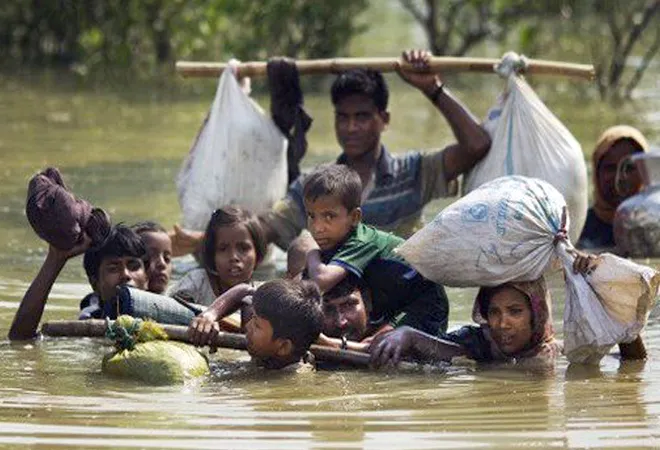External Affairs Minister Sushma Swaraj’s visit to Bangladesh has been a major confidence booster for the bilateral relationship between the two countries. The visit has come at a time when Bangladesh is grappling with a large influx of Rohingya refugees from Myanmar. Interestingly, the relationship between India and Bangladesh, otherwise warm, has been somewhat strained over the Rohingya issue largely due to the popular perception in Bangladesh that India has not adequately responded in their hour of need. The visit aimed to highlight India’s genuine support to Bangladesh’s concern.
Sushma Swaraj visited Dhaka on 22 and 23 October 2017 to attend the consultation of the foreign ministers of the two countries to assess the development in the bilateral relationship, a routine affair between the two countries. Besides reviewing the developments in the bilateral relations including the projects funded by India, the issue of Rohingya refugees from Myanmar to Bangladesh was an important agenda in her visit. During her visit, she also met various important political leaders, including the opposition party chief Begum Khaleda Zia.
Since August this year, there has been a continuous flow of Rohingya refugees into Bangladesh from Myanmar. The number has now crossed half a million. Rohingyas are an ethnic group living in Myanmar having linguistic similarities with some dialects of Bangladesh. Rohingyas fled their homes due to violence, allegedly by the Myanmar Army as a retaliation to a terror attack on army camps by an armed group belonging to the community.
Keeping in mind humanitarian concerns, Bangladesh provided shelter to the refugees but it feels it will be unsustainable for the country to retain them for long. The presence of refugees in such a large number adds to the already immense burden on its resources which are already scarce. There is also some concern about its internal stability.
Keeping in mind humanitarian concerns, Bangladesh provided shelter to the refugees but it feels it will be unsustainable for the country to retain them for long. The presence of refugees in such a large number adds to the already immense burden on its resources which are already scarce.
Some voices among the local communities are demanding the relocation of the camps from the Cox’s Bazaar area where refugee camps are mostly located. Locals fear that the refugees could disturb the demographics of the region which might lead to socio-economic tensions within communities. Also, one cannot overlook the humanitarian aspect involved, as there is the presence of a large number of youth and children who need opportunities for employment and education, that can be ensured only by stability.
Bangladesh’s anxiety also arises from the reason that Myanmar does not recognise Rohingyas as citizens and consider them illegal migrants from Bangladesh. Earlier in the 1980s and 1990s, the country experienced an exodus of Rohingyas from Myanmar following persecution. Although Myanmar took back refugees after long persistence, a large section still resides in Bangladesh. Some estimates suggest that around 400,000 refugees were already in Bangladesh. Thus, Bangladesh is seeking the support of global powers for the resolution of the issue.
Ironically, the response of powers like China and Russia, close friends of Bangladesh, has not been satisfactory for Bangladesh as they have favoured Myanmar. Hence, India being a close neighbour and an important regional power, Bangladesh expects India to take the lead in resolving the issue.
Given Myanmar’s exclusivist approach to the issue, there is some doubt about the extent of influence India can actually assert. Also, India would have to consider its own relationship with Myanmar. The humanitarian aspect of the issue also needs to be factored in while formulating a policy.
The external affairs minister, during the visit, not only expressed her concern over the spell of violence but has also been categorical in arguing for repatriation of the refugees for normalcy to return in Bangladesh.
This commentary originally appeared in Hindustan Times.
The views expressed above belong to the author(s). ORF research and analyses now available on Telegram! Click here to access our curated content — blogs, longforms and interviews.




 PREV
PREV


